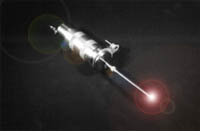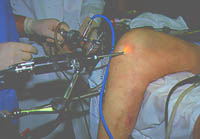
for Articular Cartilage
Ultrasound is a sound wave whose frequency is above the upper limit of human hearing, 20 KHz. Bat's echo-wave ranges around 25 KHz and up to 500 KHz, which is well in the ultrasound range. Most of medical applications of such ultrasound have been image-based diagnostic devices such as B-scanning sonography and echo-cardiography.
 |
(Click to Enlarge) |
The TCL recently developed a new application of the ultrasound as a means to characterize the mechanical properties of articular cartilage. Using a high frequency miniature ultrasound transducer, we have developed a special technique, called "In Situ Calibration Technique", to accurately measure the ultrasound speed of articular cartilage in vivo. This technique was successfully incorporated into a small arthroscopic probe instrument (See picture above).
This patent pending technology can be used to measure the mechanical properties (or stiffness) of articular cartilage through a small arthroscopic portal hole (less than 1 cm in diameter) made on the joint capsule, thus help doctors examine the status of cartilage degeneration (See picture below).
 |
(Click to Enlarge) |
This technology was recently presented at numerous international symposiums, such as annual meetings of Orthopaedic Research Society, International Cartilage Repair Society, and Bioengineering Symposium of American Society of Mechanical Engineers.
See our Publications for the further details of the ultrasound indentation techanique and the arthroscopic probe.
Have Any Questions or Comments? Please Report Any Page Errors to the
Webmaster
Send Them to Dr. J-K Francis Suh